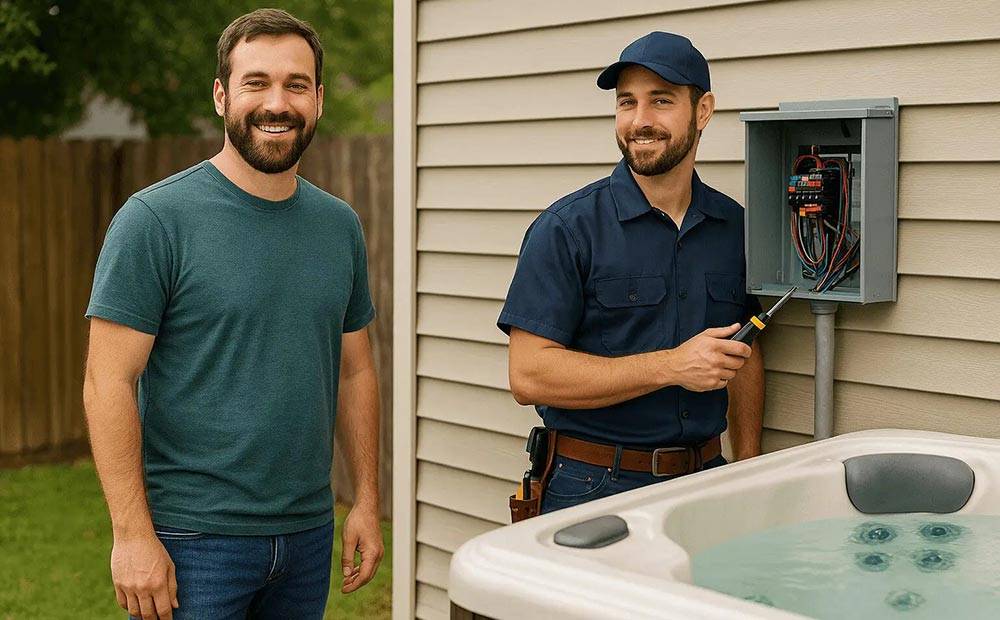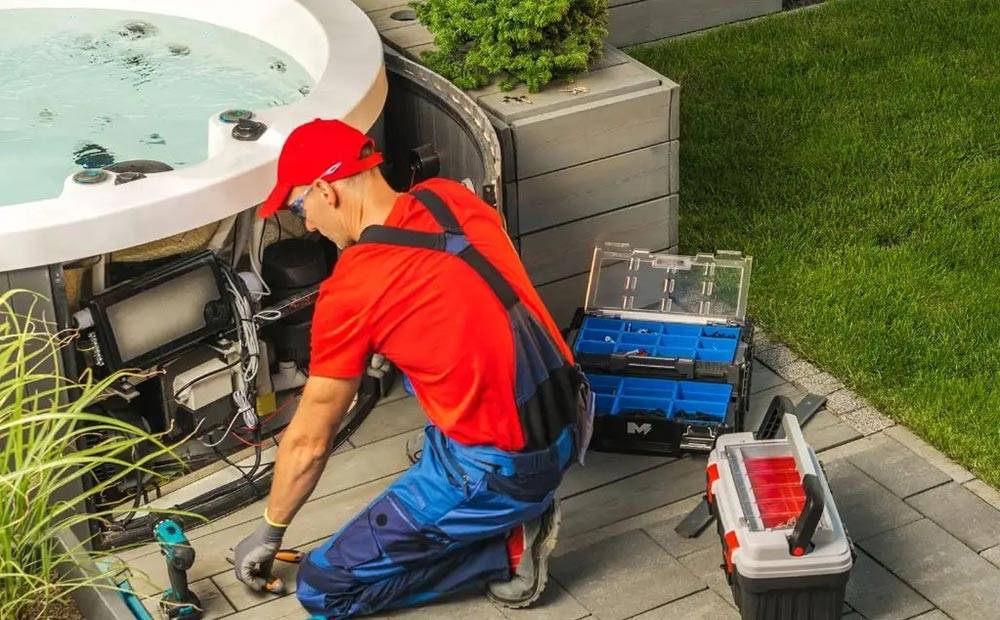So you’re ready to bring that dream hot tub to life in your backyard. Great! But before you even think about hitting the switch, here’s the question: Is your electrical setup safe and up to code?
Wiring a hot tub isn’t just about plugging in and kicking back. It involves serious electrical requirements that, if overlooked, can turn your backyard oasis into a costly or even dangerous mess. At Harmony Electric, we’ve seen it all—tubs installed without permits, circuits too weak to handle the load, and DIY jobs that ended in total rewiring.
Let’s clear things up. This guide walks you through the essential things you need to know—from electrical codes to circuit requirements to professional installation tips—so your hot tub setup is smooth, safe, and ready to enjoy.
Key rules for safe hot tub wiring
- Most hot tubs require a dedicated 240-volt, 50-amp circuit to run safely
- Permits and inspections are required in most Denver-area communities
- DIY wiring may violate code and void your manufacturer’s warranties.
- Ground Fault circuit Interrupter (GFCI) Protection is required near water.
- Hiring a licensed electrician ensures safety and code compliance.

What electrical setup does a hot tub need?
Before installation, it’s important to understand exactly what your hot tub needs in terms of power. A lot of homeowners assume it’s a one-size-fits-all setup, but it’s not.
Electrical codes vary by city and state. Most local governments require a permit and inspection before you can legally install hot tub wiring. It’s not just red tape—these rules exist to keep your wiring grounded, properly sized, and moisture-safe.

Voltage & circuit basics
Most traditional hot tubs need:
- A 240-volt, power supply and 50-amp dedicated circuit
- 6-gauge wire rated for outdoor, wet environments
- A weatherproof ground fault protection(GFCI) disconnect panel
- No shared circuits with other appliances—your hot tub needs its own line to prevent overloads
Always refer to your hot tub’s manual for the exact electrical specifications
Do I need a permit to install a hot tub in Denver?
Yes. In Denver and surrounding communities-Including Aurora, Parker, and Castle Rock-permits are typically required for any electrical work related to spa or hot tub installation.
You’ll likely need to:
- Apply for an electrical permit before starting work
- Submit a wiring plan for approval
- Schedule a post-installation inspection to confirm safety and compliance
- Skipping these steps can result in fines or worse, unsafe conditions.
Plug-and-Play vs Hardwired: Know the difference
Before making decisions about wiring, it helps to understand what kind of hot tub you have:
| Type | Plug-and-Play | Hardwired (Traditional) |
|---|---|---|
| Power source | 120V outlet | 240V dedicated circuit |
| Permit needed | Rarely | Always |
| Install time | 1-2 Hours | 4 to 8 hours + inspection |
| Best for | Temporary, portable use | Long-term, high-performance tubs |
Pro tip: Always read your hot tub manual first-Voltage, amperage, and wiring needs vary by model.
Can I wire my hot tub myself?
Technically, homeowners can do their own electrical work, but it’s risky and may not be legal without a license. Consider this comparison:
| Factor | DIY Wiring | Professional Installation |
|---|---|---|
| Cost | Lower upfront | Higher initial, safer investment |
| Code Compliance | Risky if not licensed | Guaranteed to meet local and NEC codes |
| Warranty | Likely voided | Manufacturer-approved |
| Safety | High risk of shock or fire | Safeguarded by certified pros |
Unless you’re a licensed electrician, hot tub wiring is not a DIY weekend project. Improper wiring can lead to fire hazards, electrocution, OR costly repairs. We’ve seen it – and fixed it.
Is your electrical panel ready?
Hot tubs draw a significant amount of power. Your current electrical panel must have enough capacity to handle the added load:
- Most tubs need 50-70 amps of dedicated service
- Older panels below 200 amps may require an upgrade
- Outdated or unsafe systems (like knob-and-tube wiring) need full replacement
- Harmony Electric can assess your panel and upgrade it if needed. Give us a call for a free quote
Hot tub wiring costs in the Denver Area
Wiring a hot tub doesn’t have to break the bank, but you do need to plan ahead.
- Materials: $100-$300 for wiring, GFCI, and boxes
- Labor: $400-$1,000 depending on job complexity
- Panel upgrades (if needed): $500-$1,200 if needed
Longer distances from the panel to the hot tub will increase the total cost. Our electricians offer transparent quotes and will help you plan within your budget.
Making your setup energy efficient
Want to enjoy your spa without the spike in your utility bill? Try these efficiency tips:
- Use Smart Controllers to schedule heating only when needed
- Insulate hot tub pipes to retain heat
- Keep the tub covered when not in use
- Lower the default temperature setting by a few degrees
These small tweaks can cut energy use by up to 30%.
Safety first: Keep your system in top shape
Once everything’s set up, don’t forget about maintenance. Electrical systems can wear out over time, especially outdoors.
Keep your hot tub wiring in top shape
- Get annual inspections from licensed pro
- Watch for flickering lights, buzzing or tripper breakers
- Keep the area around the panel dry and accessible
Ready to install? Let’s talk!
Wiring a hot tub safely takes more than a quick YouTube tutorial. It takes experience, the right tools and knowledge of local codes.
At Harmony Electric, we specialize in safe, efficient hot tub installations across the Denver area. Whether you need help with permitting, panel upgrades, or wiring your tub from start to finish, our team is here to help. Contact us today for a free quote. Let’s make your backyard dream a reality—safely.




